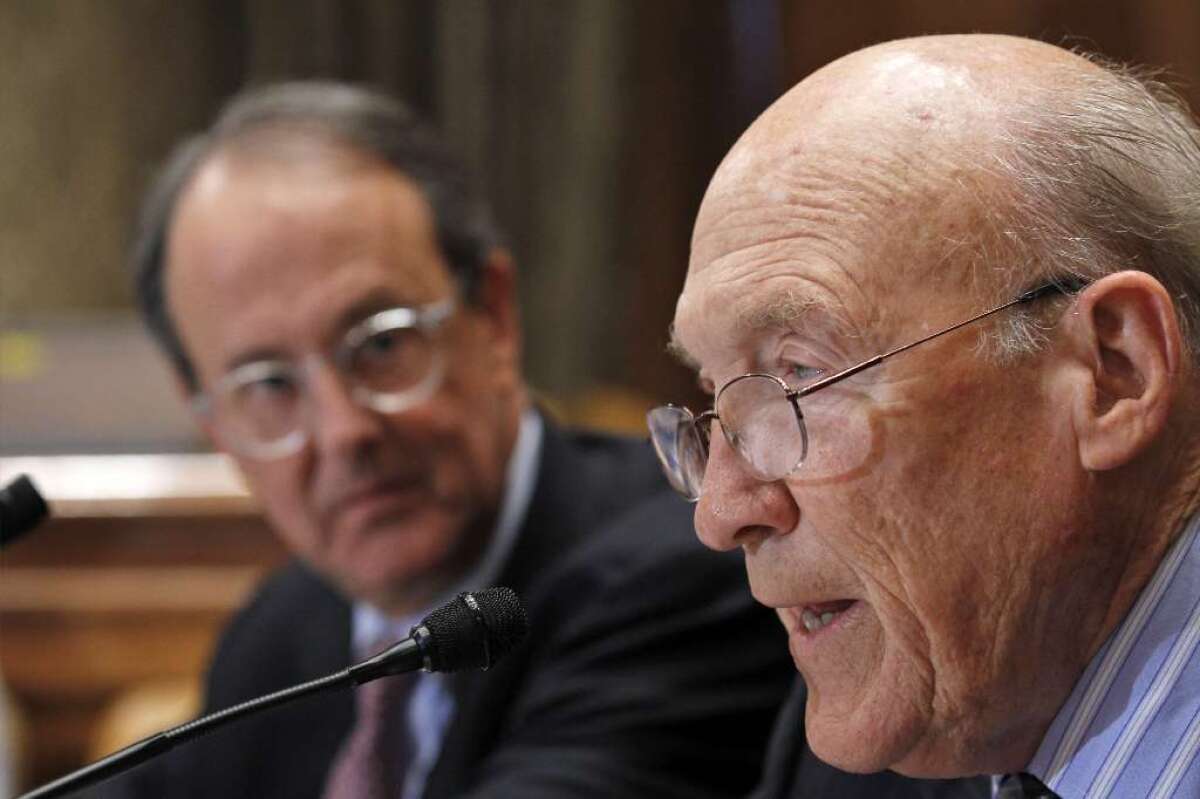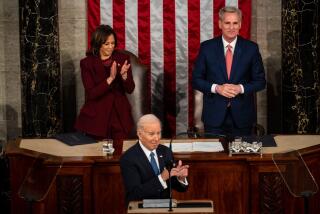Bowles, Simpson unveil plan to cut debt $2.4 trillion over 10 years

- Share via
WASHINGTON -- Erskine Bowles and Alan Simpson, who have been pushing for a major deficit reduction plan since co-chairing a bipartisan commission on fiscal reform, released a new proposal Tuesday to cut the nation’s debt by $2.4 trillion over the next decade.
Called “A Bipartisan Path Forward to Securing America’s Future,” the plan attempts to avoid the large automatic spending cuts set to hit March 1 while also dealing with long-term debt drivers such as Medicare.
“The problem is real, the solutions are painful, and there is no easy way out,” the two said in a summary of their plan. “What we are calling for is by no means perfect, but it could serve as a mark for real bipartisan negotiations on a plan to reduce the deficit and grow the economy.
“It is time for our country to put this ultra-partisanship aside and pull together, not apart,” they said.
Quiz: How much do you know about looming federal budget cuts?
Bowles, a Democrat and former White House Chief of Staff under President Clinton, and Simpson, a former Republican senator from Wyoming, headed the National Commission on Fiscal Responsibility and Reform.
Bowles and Simpson proposed a wide-ranging deficit reduction plan, but the commission did not agree to adopt it in 2011.
The two have continued to urge Washington politicians to compromise and agree to a broad package that includes additional tax revenue and spending cuts. They now chair the Moment of Truth project, a bipartisan group pushing a comprehensive solution to the nation’s debt problem.
Policymakers instead have taken a piecemeal approach, which Bowles and Simpson said their new plan tries to expand.
The first two steps of their four-step approach have already taken place. First there were spending cuts enacted as part of the 2011 deal to increase the debt limit.
And then there was increased revenue from an agreement enacted Jan. 2 to allow a temporary payroll tax cut to expire and to increase tax rates on annual household income of more than $450,000.
Bowles and Simpson said the next step is to enact serious entitlement and tax reform to produce about $2.4 trillion in deficit reduction and replace the $1.2 trillion in automatic spending cuts.
The plan calls for reducing Medicare and Medicaid spending by about $600 billion by, among other things, raising premiums on high earners.
Bowles and Simpson also want to overhaul the tax code by eliminating or scaling back most deductions, using some of the savings -- about $600 billion -- to reduce the deficit and some to lower tax rates.
On top of that, the plan would reduce spending by another $1.2 trillion over the next decade through a combination of mandatory spending cuts and other changes, such as altering the way annual Social Security cost-of-living increases are calculated
The fourth step is to take action to make Social Security and highway funding solvent and Medicare sustainable.
“We’re going to have to push the White House on entitlement cuts. We’re going to have to push the Republicans on revenue,” Bowles told CNBC. He called the looming federal budget cuts, known as sequestration, “stupid, stupid, stupid” because the cuts are indiscriminate.
Bowles and Simpson predicted the public backlash from those cuts would lead to public pressure on Washington to replace them with a comprehensive deficit-reduction plan that does not endanger the economic recovery.
They’re touting their proposal as the way to do that.
“Although additional deficit reduction need not be enacted all at once in a single package, it should be enacted promptly,” Bowles and Simpson said. “The longer we wait the fewer options we will have and the less time we will be able to give individuals and businesses to prepare and adjust.”
ALSO:
Automatic budget cuts are almost certain
Democrats float plan to avoid automatic slash in spending
Bowles, Simpson tell policymakers to get serious on debt reduction
More to Read
Inside the business of entertainment
The Wide Shot brings you news, analysis and insights on everything from streaming wars to production — and what it all means for the future.
You may occasionally receive promotional content from the Los Angeles Times.











